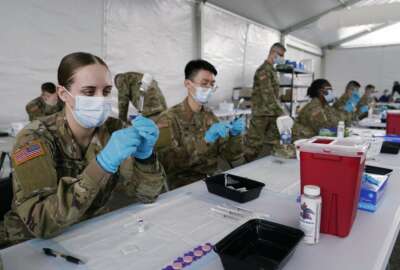Could the vaccine mandate harm the U.S. military in the long term?
Attorney Robert Capovilla says discharging service members who refused COVID vaccines has legal and military flaws.
Best listening experience is on Chrome, Firefox or Safari. Subscribe to Federal Drive’s daily audio interviews on Apple Podcasts or PodcastOne.
The armed services have been discharging members who refused COVID vaccines. Now that policy has affected only a small percentage of troops. But Robert Capovilla says the policy still has legal and military flaws. He is a partner in the law firm Capovilla and Williams, and he joined Federal Drive with Tom Temin for more discussion.
Interview transcript:
Tom Temin: Mr. Capovilla, good to have you on.
Robert Capovilla: Good to be here, Tom. Thank you.
Tom Temin: Temin 0:20
And your firm exclusively represents members of the military around the world, correct?Robert Capovilla: That’s right, folks that serve our country who are facing investigation or court martial or administrative separations.
Tom Temin: Alright, so let’s talk about the legalities of the COVID vaccine. People enter the military and pretty much your life ceases to be your own for a variety of good reasons. And so why is a vaccine mandate any different for a military order ordered by superior officers?
Robert Capovilla: In some ways, it’s not different at all right? I mean, vaccines have been around the military for a long time, there was litigation over the anthrax vaccine. But in some ways, Tom, how the Department of Defense, the military is handling the COVID vaccine is a little bit unique. And what I mean by that is to take a look at specifically the new Army policy, they’re literally saying that they’re going to kick folks out for not getting the vaccine, and those folks are likely going to end up with general under honorable conditions discharges and their DD214’s are going to say “Separated for serious misconduct,” which, Tom, is the same thing somebody would get from the military if they were being separated for drug use, domestic violence, assault consummated by a battery. So essentially, what the Army in particular is doing here is they are making sure that these soldiers who don’t want the vaccine are being absolutely punished, and in my opinion, a little bit over punished for simply saying, “I don’t want to put that in my body.”
Tom Temin: And of course, that affects their ability to get VA benefits. And it could affect job prospects throughout their lives if someone sees that mark on the record?
Robert Capovilla: Yeah, so when somebody is involuntarily separated from the United States military, and they’re given a general under honorable conditions discharge, they’re very likely or at least in certain circumstances, they’re going to lose those education benefits that they otherwise would have earned with their service. And when you’re talking about somebody who has served five, six, seven, eight, 10, 15 years, that’s a pretty significant blow. And again, it’s the same kind of blow that an Army soldier would get if they were separated for a domestic violence incident, or for using and abusing illegal narcotics. So it certainly is something that is serious and can impact these soldiers for the remainder of their lives, quite frankly.
Tom Temin: Well, what happens say if a flu vaccine is turned down by a soldier or say, the anthrax vaccine, when that came out? Did people turn that down? And what happened then?
Robert Capovilla: People did. Certain soldiers did have serious problems with the anthrax vaccine, there was litigation over it. The flu vaccine off the top of my head, I don’t recall any litigation over the particular flu vaccine. But what I would say is the justification for it all is the same, right? The Department of Defense, the commander in chief comes out and says if there is a military nexus between taking this vaccine or the flu shot or the anthrax vaccine and being able to fight our nation’s wars, which is a good justification. It’s just when we implement these policies I don’t think these particular soldiers and airmen and Marines should be facing the same kind of penalties you would face if you committed a more serious crime. In other words, I don’t think that refusing a COVID vaccination should be considered serious misconduct with putting your DD214 for the remainder of your life.
Tom Temin: Should it be considered in any manner? And if so, then what might be consequences that you feel would be fair?
Robert Capovilla: I do think it should be considered because the military is based on the ability of a commander looking at their soldiers and saying, go take the hill. And you have to have good order and discipline to do that. And enforcing the COVID vaccine is a part of discipline. I would much prefer if the position of the DoD was these folks get honorable discharges and there will be a specific policy carved out so on their DD214 it doesn’t say serious misconduct, it says COVID refusal. This way when these soldiers and sailors and airmen move on with their lives, and they go for a job and somebody asked were you ever involuntarily separated from the military? Did you ever receive something other than honorable discharge, they can show a DD214 that puts the alleged misconduct in perspective. Otherwise, that DD214 just very generally says serious misconduct which is going to hurt folks as they move on in their civilian capacities.
Tom Temin: We’re speaking with attorney Rob Capovilla, he’s a partner at Capovilla and Williams. And do you feel this has any effect on recruiting since the armed services are having trouble meeting their recruiting goals these days? And it seems like less and less of the population is eligible, let alone volunteering.
Robert Capovilla: That is, I think, at the heart of this entire matter in a lot of ways. Only 1% of the U.S. population says we’re going to put on a uniform and put ourselves in harm’s way to go serve our country. And we have to treat that 1% fairly. And I don’t think it’s any coincidence that just as the Army is moving forward with now involuntarily separating folks, that they’re offering a new $50,000, signing bonus to recruits who want to join the Army. We have a manning problem. And we’re losing really good people over the COVID vaccine. And I’m not saying that’s not just, I’m just saying they should be a little more fair with how they’re going about executing the policy.
Tom Temin: Yes, but I guess I’m asking do you think the COVID policy itself or the vaccine policy, the medical policies are a contributing factor to the dampening of recruitment? Or maybe that’s too much of a stretch?
Robert Capovilla: It’s hard for me to say. I think a common sense perspective would say yes, because there are a lot of people that do not want to put the COVID vaccine in their body. I mean, they consider it toxic. So you are alienating at least some folks who might otherwise want to join who are not going through now.
Tom Temin: But otherwise, it’s more of just a bad coincidence, when recruitment levels are difficult, and they’re discharging people that otherwise could serve admirably, for no other reason, then they did not get a vaccine?
Robert Capovilla: I would agree with that, yeah.
Tom Temin: And without naming names, of course, but have you had clients come to you with this issue? And what has their reasoning been? And what kind of defense can you really mount in their behalf?
Robert Capovilla: We’re getting calls on a daily basis from folks that are now getting separated for their vaccine refusal. And I’ll be frank with you, Tom, we’re not taking those cases on because quite frankly, I’m not going to take somebody’s hard-earned money when I already know that their religious exemption or medical exemption has a 99.9% chance of not being approved. So yeah, we get a lot of calls on it. It’s impacting a lot of people. But the fact of the matter is these exemptions are not getting approved, they’re not getting approved at an astronomically high rate. So quite frankly, we’re happy to talk with folks give them the guidance that we can but we’re not taking somebody’s hard-earned money for this right now because it wouldn’t be right given how the DoD’s treated these exemptions.
Tom Temin: Attorney Rob Capovilla is a partner at Capovilla and Williams. Thanks so much for joining me.
Robert Capovilla: I appreciate you, Tom. Thanks for having me.
Copyright © 2024 Federal News Network. All rights reserved. This website is not intended for users located within the European Economic Area.
Tom Temin is host of the Federal Drive and has been providing insight on federal technology and management issues for more than 30 years.
Follow @tteminWFED







